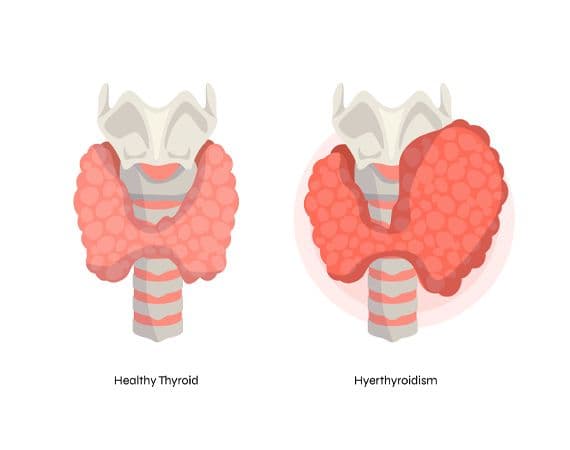
Hyperthyroidism
What is hyperthyroidism?
Hyperthyroidism occurs when the thyroid gland produces excessive amounts of thyroid hormone, leading to an overactive thyroid. This condition accelerates the body's metabolism, causing symptoms such as weight loss, hand tremors, and a rapid or irregular heartbeat. As your metabolism speeds up, it can disrupt various aspects of your health, leaving you feeling unbalanced or out of control. The thyroid, a butterfly-shaped gland located at the base of the neck, plays a crucial role in maintaining normal body functions. When it produces too much hormone, it can change your hair, vision, heart rate, mood, and weight.
Hyperthyroidism typically requires medical treatment, as the thyroid cannot correct the imbalance on its own. Depending on the severity, treatment may involve medications or, in some cases, surgery. Seeking medical care for hyperthyroidism is essential to restoring balance and feeling like yourself.
What causes hyperthyroidism?
Hyperthyroidism occurs when the thyroid gland produces too much thyroid hormone, affecting the body's metabolism. The thyroid, a small butterfly-shaped gland located at the base of the neck, plays a crucial role in regulating the body's use of fats, carbohydrates, and proteins. It also helps control body temperature and heart rate. The two main thyroid hormones—thyroxine (T4) and triiodothyronine (T3)—influence nearly every cell in the body, and an excess of these hormones can cause various health issues.
Several conditions can lead to hyperthyroidism:
1. Graves' Disease: This autoimmune disorder is the most common cause of hyperthyroidism. It occurs when the immune system attacks the thyroid gland, prompting it to produce excessive amounts of thyroid hormones.
2. Overactive Thyroid Nodules: Also known as toxic adenoma or a toxic multinodular goitre (Plummer's disease), this condition involves noncancerous lumps (adenomas) in the thyroid gland that produce too much thyroid hormone, leading to an enlarged thyroid.
3. Thyroiditis refers to thyroid gland inflammation, which may occur due to an autoimmune disorder or for unknown reasons. The inflammation can cause stored thyroid hormones to leak into the bloodstream, resulting in hyperthyroidism. In some cases, thyroiditis can lead to hypothyroidism after the inflammation subsides.
Other causes of hyperthyroidism include:
- Excessive Iodine Consumption: Consuming too much iodine through foods, medications, or iodine-based medical treatments can cause the thyroid to produce more hormones, triggering hyperthyroidism.
- TSH-Releasing Pituitary Adenoma: This rare condition involves a tumour in the pituitary gland that releases excessive thyroid-stimulating hormone (TSH), which stimulates the thyroid to produce more hormones.
Recognizing the underlying cause of hyperthyroidism is essential for appropriate treatment, which may include medications, radioactive iodine therapy, or surgery.
What are the risk factors of hyperthyroidism?
Several factors can increase the risk of developing hyperthyroidism, including:
- Family History: A family history of thyroid disease, particularly Graves' disease, can increase the likelihood of developing hyperthyroidism.
- Chronic Illnesses: A personal history of certain conditions, such as pernicious anemia and primary adrenal insufficiency, may elevate the risk.
- Pregnancy: Recent pregnancy can raise the risk of developing thyroiditis, which may lead to hyperthyroidism.
What are the symptoms of hyperthyroidism?
Hyperthyroidism can affect various parts of your body, leading to a range of symptoms. You may experience some symptoms or several at once. Common symptoms of hyperthyroidism include:
- Rapid heart rate (tachycardia) or heart palpitations
- Increased blood pressure
- Tremors or shakiness, particularly in the hands
- Feelings of anxiety, nervousness, or irritability
- Unexplained weight loss despite normal or increased appetite
- Frequent diarrhoea or more frequent bowel movements
- Increased sweating and sensitivity to heat
- Hair loss or brittle hair
- Trouble sleeping (insomnia)
- Changes in menstrual cycles, such as lighter or missed periods
- Swelling or enlargement of the neck (goitre)
- Bulging or swelling of the eyes (thyroid eye disease)
These symptoms may appear suddenly or develop gradually. If you notice any of these signs, it's essential to consult your healthcare provider for proper diagnosis and treatment.
When to see the doctor
If you experience unexplained weight loss, a rapid heartbeat, excessive sweating, swelling at the base of your neck, or other signs of hyperthyroidism, schedule an appointment with our healthcare provider. Be sure to mention all symptoms you've observed, even those that seem minor.
Once diagnosed with hyperthyroidism, most individuals will need regular follow-up appointments with their healthcare provider to monitor their condition.
FAQS
Health In A Snap, Just One App.
KNOW MORE
